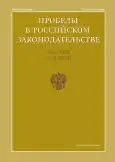Terrorism: Organized Criminal Legal Aspects
- Autores: Khardina Y.V.1, Vasin Y.G.1
-
Afiliações:
- Russian State Social University
- Edição: Volume 17, Nº 5 (2024)
- Páginas: 78-84
- Seção: Criminal Law Sciences
- URL: https://bakhtiniada.ru/2072-3164/article/view/265980
- EDN: https://elibrary.ru/KBNTVQ
- ID: 265980
Citar
Resumo
This article is devoted to the criminal legal issues of terrorism and organized crime from the point of view of the relationship and appropriate legislative consolidation of these negative social and legal phenomena in the articles of the Criminal Code of the Russian Federation.
The provisions of criminal legislation are analyzed as they relate to criminal offenses constituting terrorist activities. Signs have been identified that make it possible to classify certain articles of the Special Part of the Criminal Code of the Russian Federation as belonging to the sphere of organized crime. Factual circumstances are indicated that allow, in the manner prescribed by the Criminal Procedure Code of the Russian Federation, to prove specific signs indicating the presence of organization in the crime. The relevant provisions of the decisions of the Plenum of the Supreme Court of the Russian Federation are given.
The authors' position is formulated regarding the list of articles of the Special Part of the Criminal Code of the Russian Federation related to terrorist activities. Signs of criminal legal characteristics are identified that make it possible to classify specific articles in the specified list as the sphere of organized crime.
It is noted that in a number of articles providing for criminal liability for terrorist activities, their organized nature is indicated as qualifying or specially qualifying features, and in other articles the signs of organization are constitutive, that is, they are signs of the main element of the crime.
A number of conclusions have been made regarding the state of criminal law ensuring the protection of the sphere of public relations from the terrorist threat, especially of an organized nature. The constantly evolving nature inherent in both the phenomenon of terrorism and organized crime is noted.
Proposals have been formed aimed at improving the provisions of the Criminal Code of the Russian Federation in the area of public relations under consideration.
The work is aimed at a fairly wide range of readers. It seems that it can arouse interest not only among specialists in the field of criminal law and criminology, legislators and law enforcers, but also among students and graduate students of law schools interested in this problem.
Palavras-chave
Texto integral
##article.viewOnOriginalSite##Sobre autores
Yulia Khardina
Russian State Social University
Autor responsável pela correspondência
Email: xardina15@list.ru
ORCID ID: 0000-0001-6270-7915
Cand.Sci.(Politics), Associate Professor of the Department of National Security, Countering Terrorism and Extremism, Faculty of Integrated Security and Basic Military Training
Rússia, MoscowYury Vasin
Russian State Social University
Email: vasin65@mail.ru
ORCID ID: 0000-0002-6789-880X
Cand.Sci.(Law), College Professor
Rússia, MoscowBibliografia
- Rakhmanova E.N. The relationship between organized crime and terrorist activity // Criminalist. 2020. No. 2 (31). pp. 29-33.
- Vasnetsova A.S. The relationship between terrorism and organized crime // National Security / nota bene. 2019. No. 5. P. 66-79. doi: 10.7256/2454-0668.2019.5.28002 URL: https://nbpublish.com/library_read_article.php?id=28002.
- Criminal policy of the Russian Federation: problems and prospects: monograph / edited by. ed. S.V. Maksimova, V.L. Schultz; resp. ed. S.A. Bochkarev. Moscow: Prospekt, 2021. 824 p.
- Criminology / resp. ed. I.M. Matskevich. Moscow: Prospekt, 2023. 512 p.
- Leonov V.V. Legislative activity of the Federation Council of the Federal Assembly on issues of security and defense capability of Russia in 1994 - 2004: dis. ...cand. ist. sciences: 5.6.1. M., 2009. 201 p.
- Zelenkov M.Yu. Religious terrorism and extreme psychology - ambivalence of relationships: monograph. M., 2024. 200 p.
- Rakhmanov N.V. Terrorist organizations as a non-state subject of the system of international relations: dis. ...cand. polit. sciences: 5.5.4. Nizhny Novgorod, 2022. 185 p.
Arquivos suplementares








